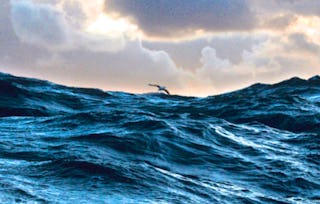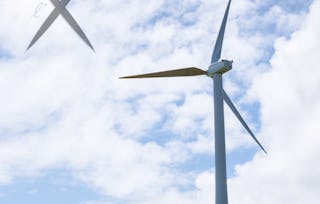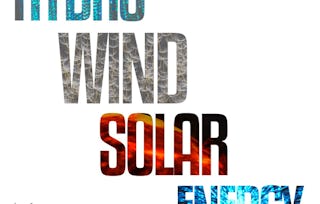In this course you can learn about the mechanics of global weather, the foundations of ocean meteorology, predictive modeling and how sailors receive data via satellite and use high-performance navigation software.


Strategies for winning. Meteorology in a round the world regatta


Strategies for winning. Meteorology in a round the world regatta

Instructeur : Tomàs Molina
6 370 déjà inscrits
Inclus avec
144 avis
Compétences que vous acquerrez
- Catégorie : Communication Systems
- Catégorie : Mathematical Modeling
- Catégorie : Safety Assurance
- Catégorie : Time Series Analysis and Forecasting
- Catégorie : Decision Support Systems
- Catégorie : Risk Control
- Catégorie : Predictive Modeling
- Catégorie : Physical Science
Détails à connaître

Ajouter à votre profil LinkedIn
6 devoirs
Découvrez comment les employés des entreprises prestigieuses maîtrisent des compétences recherchées

Il y a 6 modules dans ce cours
In this module you will learn the foundations for an understanding of general and in particular maritime meteorology. What are the factors and engines powering the weather? What do we need to know to understand the weather phenomena we experience every day? What do ocean sailors need to know to predict the weather? Instructors: Tomàs Molina, Santi Serrat
Inclus
13 vidéos13 lectures1 devoir
In this module you will learn: How meteorological predictions are made. What numerical weather models and equations look like. This will be explained by Tomàs Molina in Module 2.1 You will look at the forecasting structures that help us to interpret the information given by the models: Advection, troughs, ridges, barometric swamps and low pressure systems. These will be explained by Tomàs Molina in Module 2.2 What the basic prediction models used by sailors are. This will be explained by Marcel van Triest in Module 2.3 Remember you can access to the help forum . If you are experiencing difficulty learning or accessing course content, or if you simply want more information.
Inclus
10 vidéos12 lectures1 devoir
In this module you will learn how sailors use meteorology to sail around the world and to win round the world regattas. All of their interest is focussed on the wind and they need theoretical, but above all practical, knowledge to help them to take the correct decisions at sea. Remember you can access to the help forum. If you are experiencing difficulty learning or accessing course content, or if you simply want more information.
Inclus
14 vidéos17 lectures1 devoir
The science of meteorology is a fundamental part of any type of ocean navigation. In the case of yacht racing, it's importance is even greater, given that the wind is the force propelling the boat and is the key factor in formulating the strategy and tactics needed to win. However, the lead role of meteorology in a regatta is for safety, and that is something that the race organisers always make a priority. In Module 4.1 the general climatology for a regatta such as the Barcelona World Race is described, as well as the preparations the skippers make with the sails, the boat and other personal kit. In Module 4.2 you will learn how the Race Management of a regatta work together with the meteorologist to ensure that the information reaches the boats and to guarantee the maximum safety levels for the crews. In Module 4.3 the type of information the crews receive whilst out on the oceans is described, as well as the telecommunications systems used to make this happen. In Module 4.4 you will learn how weather information impacts on safety and you will look at the specific case of ice detection in the Southern Ocean.
Inclus
7 vidéos6 lectures1 devoir
We begin now by going over the Barcelona World Race round the world route. In Module 5 you will learn about general and specific strategies for sailing from Barcelona to the Indian Ocean.
Inclus
7 vidéos6 lectures1 devoir
In this module we are going to study the meteorology and strategy for the seas of the south of the planet. Down in the Southern Ocean is where the sailors go up against the toughest sailing conditions in the regatta and where they must also abide by safety restrictions due to the danger of floating ice. On the following pages, Marcel van Triest will analyse general strategy and also look at case studies from the Barcelona World Race 2010/11. In that edition, ice gates were used to restrict the fleet's descent south and to avoid boats heading into danger zones. For the 2014/15 edition, however, ice gates have been substituted by a “restriction zone”, a polygon with some 72 sides surrounding the Antarctic. In this video Marcel explains the general context of the passage through the Southern Ocean and reviews the routes taken in the 2010/11 edition of the race. They key difference in this edition is that the regatta does not take the boats through Cook Strait (New Zealand).
Inclus
6 vidéos5 lectures1 devoir
Instructeur

En savoir plus sur Physics and Astronomy
 Statut : Prévisualisation
Statut : PrévisualisationUniversitat de Barcelona
 Statut : Essai gratuit
Statut : Essai gratuitISAE-SUPAERO
 Statut : Prévisualisation
Statut : PrévisualisationÉcole Polytechnique
 Statut : Prévisualisation
Statut : PrévisualisationÉcole Polytechnique
Pour quelles raisons les étudiants sur Coursera nous choisissent-ils pour leur carrière ?

Felipe M.

Jennifer J.

Larry W.

Chaitanya A.
Avis des étudiants
- 5 stars
65,97 %
- 4 stars
25,69 %
- 3 stars
4,86 %
- 2 stars
0,69 %
- 1 star
2,77 %
Affichage de 3 sur 144
Révisé le 4 sept. 2023
It was an enjoyable throughout the weeks. It was simple and yet informative.
Révisé le 12 mars 2021
I found the course very informative, a nice introduction to world meteorology. Thanks for sharing.
Révisé le 14 sept. 2017
Awesome course. If you're into sailing or meteorology there is nothing better. The amount of knowledge conveyed in this short course is immense, yet it's fun and captivating the whole time.

Ouvrez de nouvelles portes avec Coursera Plus
Accès illimité à 10,000+ cours de niveau international, projets pratiques et programmes de certification prêts à l'emploi - tous inclus dans votre abonnement.
Faites progresser votre carrière avec un diplôme en ligne
Obtenez un diplôme auprès d’universités de renommée mondiale - 100 % en ligne
Rejoignez plus de 3 400 entreprises mondiales qui ont choisi Coursera pour les affaires
Améliorez les compétences de vos employés pour exceller dans l’économie numérique
Foire Aux Questions
To access the course materials, assignments and to earn a Certificate, you will need to purchase the Certificate experience when you enroll in a course. You can try a Free Trial instead, or apply for Financial Aid. The course may offer 'Full Course, No Certificate' instead. This option lets you see all course materials, submit required assessments, and get a final grade. This also means that you will not be able to purchase a Certificate experience.
When you purchase a Certificate you get access to all course materials, including graded assignments. Upon completing the course, your electronic Certificate will be added to your Accomplishments page - from there, you can print your Certificate or add it to your LinkedIn profile.
Yes. In select learning programs, you can apply for financial aid or a scholarship if you can’t afford the enrollment fee. If fin aid or scholarship is available for your learning program selection, you’ll find a link to apply on the description page.
Plus de questions
Aide financière disponible,



